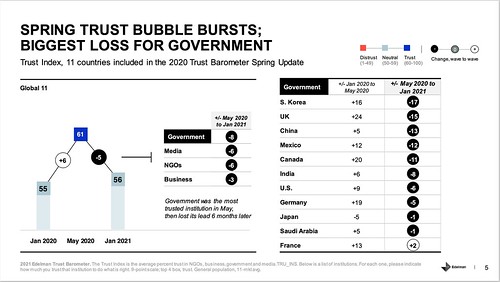1 minutes estimated reading time
The Cummings effect was named by The Guardian after former government advisor Dominic Cummings. Now famous for his unorthodox approach to sight tests.
The Cummings effect describes how consumers have been testing the rules governing lockdown, often ignoring the government’s ‘stay at home’ instruction.
“What is happening is people are beginning to flout the rules, they are beginning to think, ‘How can I get away with the rules?’” Paul Netherton, Devon and Cornwall’s deputy chief constable
‘Cummings effect’: why are people bending lockdown rules? – The Guardian
Cummings effect is part of broader trust deficit
Edelman released their Trust Barometer, and the findings were ugly for government trust, across most of the countries that they surveyed.
They were also bad for societal leaders as well. Dominic Cummings bizarre behaviour was a question of the wrong thing at the right time and fits into this broader disappointment.
Do as I say, not as I do
Throughout COVID-19; there has been a consistent desire for sufficient lockdowns to get COVID-19 under control. The latest bit of YouGov consumer opinion research still indicates a desire for lockdown to try and control COVID better.
However, there was evidence as far back as April that the first lockdown instructions in the UK weren’t being adhered to. UCL analysed data from Huq found that the first lockdown lasted just three weeks in areas outside London. News reports and infection rates indicate that the situation maybe similar if not worse this time around. More related content here.
More information
Britain on the move even before Johnson eased lockdown, data show – Financial Times (May 12, 2020)
Most people don’t think the government will meet its 2m a week vaccine target – YouGov (January 7, 2021)
‘Cummings effect’: why are people bending lockdown rules? – The Guardian (January 11, 2021)


